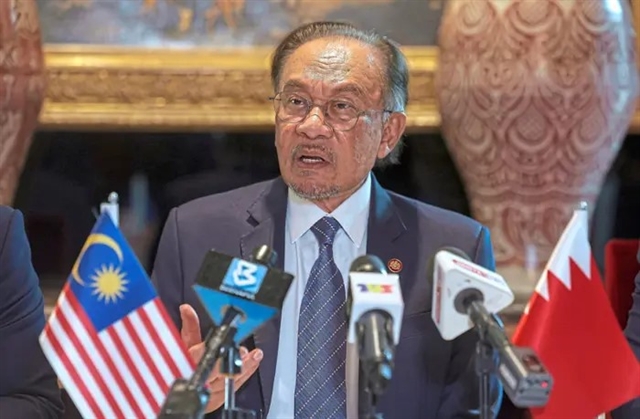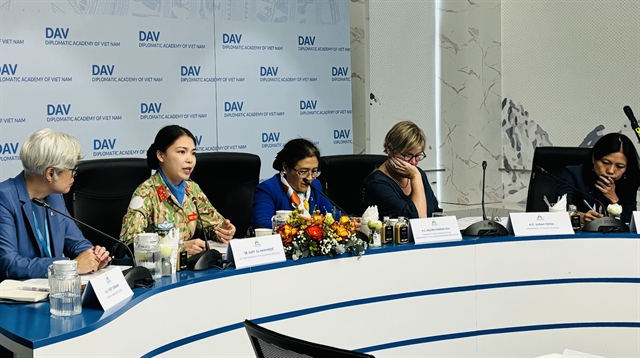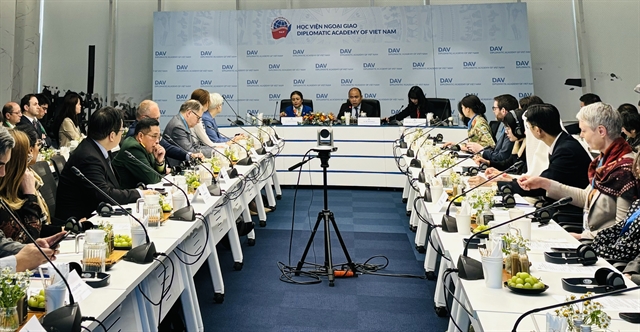 World
World

 |
| Female panelists share opportunities and challenges posed by digital technology on women. — VNS Photos Khánh Dương |
HÀ NỘI — Opportunities and challenges brought by digital transformation have left strong impacts on not only the landscape of peace and security in ASEAN, but also within the implementation of regional women, peace, security (WPS) agenda, heard a roundtable discussion within the framework of ASEAN Future Forum in Hà Nội on Tuesday.
In that context, ASEAN needs coordinated efforts across various sectors to address challenges and barriers to ensure that women are not left behind in the digital transformation, they said.
Within the forum 'Women, Peace and Security-Digital Inclusion for Sustainable Peace', the discussion proposed recommendations on the women, peace and security agenda’s implementation in the digital era, offering policy consultation on digital gaps between men and women in peacekeeping activities.
In his key note speech, the Secretary of State of Cambodia’s Ministry of Foreign Affairs and International Cooperation, Kung Phoak, expressed gratitude for the ASEAN’s collective and substantial contributions to the WPS agenda.
He said ASEAN countries faced challenges of aligning national priorities with the regional framework, citing that sometimes national priorities move quickly, while regional frameworks lag behind.
 |
| The roundtable discussion was held as part of the ASEAN Future Forum in Hà Nội. |
He emphasised the importance of the WPS agenda and the need for a comprehensive and integrated framework while calling for redoubled efforts to translate the regional WPS priorities into national policies.
Sharing stories on how digital technology empowers women in the peacekeeping forces, Lieutenant Sa Minh Ngọc from Việt Nam Peacekeeping Department, said many technologies had been used to enhance the early warning system in the peacekeeping operation.
In Somalia, social media analysis helped detect misinformation that could activate violence, while in Uganda AI-powered radio analysis identified the social tensions in real time. These technologies' innovations helped prevent crisis before the earthquake and create a successful environment for women to actively participate in rebuilding their community.
"AI-driven virtual platform and digital communication tools are now enabling more women to participate in these peace-building efforts, even in conflict-affected areas where physical participation may be difficult," she said.
However, the digital tools present many challenges, according to Ngọc. For example, in many post-conflict areas, there is lack of connectivity, lack of electricity and technical resources. Without a strong digital infrastructure, those mentioned opportunities may remain out of reach for women.
"Addressing these issues requires more than just generational responses," she said.
Women, whether as victims or citizens in conflict zones, often faced higher risk of violence, particularly gender-based violence, she said. One of the key challenges for women in this peace-building effort was limited access to decision-making spaces. As women became more active in digital spaces, they faced cyber threats, misinformation, disinformation and online harassment.
If the AI system lack of gender inclusive design, it might reflect a really positive aspect of inequality rather than addressing them, she said.
The regional programme lead from UN Women Indonesia and ASEAN Ryce Chanchai, who is a governance peace and security specialist, said ASEAN was at the critical forefront of addressing non-traditional emerging peace and security issues.
The interlinkage between traditional and non-traditional peace and security challenges remained very real and presented in the most rapidly changing landscape of peace and security challenges across the world and Southeast Asia, she said.
With Southeast Asia being at the forefront of this, AI driven scams had become sophisticated, harder to detect and not just pose significant challenges to individuals and businesses alike, but also had data openly traded on a vast scale, she said, adding that Southeast Asia was now host to a multi billion criminal industry, with one of the highest rate cyber attacks in the world, she said.
She expressed her thankfulness to Việt Nam for taking the leading role in the WPS agenda. “We were at the critical juncture of defining the post 2025, ASEAN vision for the next 20 years of our region. Therefore addressing gender dimension of digital inclusion, particularly in addressing cyber crime, cyber attacks in Southeast Asia, misinformation, disinformation happening all over the places in our region, is the most critical and significant.
“Without addressing this would be a missing opportunity and a great risk for a region, firstly, the gender dimension and the disproportion impact on the cyber crime movement,” she said.
She cited statistics that at least 220,000 individuals had been trafficked in Southeast Asia and forced to work in online scam operations.
"We usually have trafficking for other things, but now we have trafficking for online scam and cyber crime. There is a need to incorporate gender and social inclusion lens into the new ASEAN cyber security cooperation strategy," she said.
She also proposed linking WPS with the youth, peace and security agenda as well as empowering young women and young men in digital inclusion and cyber security.
British Ambassador to ASEAN, Sarah Tiffin, said digital connectivity became more accessible in peace processes and in conflict situations.
"You're creating new space for people to connect, to engage, particularly those who might traditionally be excluded from a more traditional peace process. They can come in via the digital space. Everybody can access real-time information and communications. It gives you the opportunity to be more effective, tap into more effective early warning of risks that might be on the horizon. It supports everyone to come together collectively to respond to a conflict or a crisis situation," she said, adding that, at the same time, it opens up risks of increased surveillance.
Sharing experience from the UK, she said it was the first country to develop a comprehensive approach to how you incorporate digital into development policymaking.
"We set very clear targets for women's representation in cyber policymaking, in senior levels of the armed forces and so on. As we have been designing our digital frameworks and our cyber policies, both domestically and our approach internationally, we've consciously brought in not just civil society to work with governments on developing these, but also the private sector," she said. VNS




